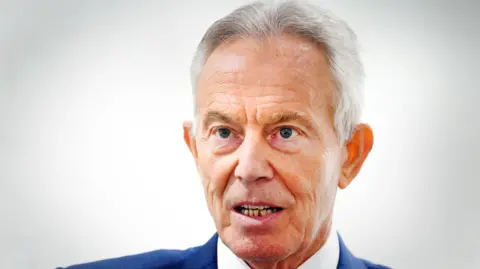**Tony Blair Critiques Current Net-Zero Policies as Unviable**
In a recent report, former Prime Minister Sir Tony Blair has raised substantial concerns regarding the effectiveness of current net-zero policies, stating that they are “doomed to fail” if they continue on their present trajectory. Blair argues that the current approach of limiting energy consumption and fossil fuel production does not resonate well with the public, who feel they are being burdened with financial sacrifices that yield minimal impact on global emissions.
Blair’s critique does not entail a call for the Labour Party to abandon its commitment to decarbonising the UK economy. Instead, he advocates for a comprehensive re-evaluation of strategies employed by governments worldwide. According to him, the limitations within the existing framework are evident and warrant immediate attention rather than blind continuation.
Blair’s comments come amid growing political contention surrounding net-zero initiatives. The Conservative Party, which has aligned with Reform UK to oppose the goal of attaining net-zero emissions by 2050, has urged Labour to slow down its ambitious plans. However, the government has made it clear that it intends to maintain its course toward achieving this milestone.
In the report titled *The Climate Paradox: Why We Need to Reset Action on Climate Change*, the Tony Blair Institute outlines the failures of global organizations, such as COP and the United Nations, in effectively addressing climate change. This criticism aligns with a broader sentiment expressed by the public, who are increasingly skeptical about climate policies due to the lack of tangible benefits, such as promised green jobs and economic growth, especially in light of global disruptions caused by the Covid pandemic.
Blair suggests that although there is widespread acknowledgment of climate change as a human-induced phenomenon, many are distancing themselves from climate politics. He argues this skepticism stems from the belief that current solutions are flawed and built on poor policy decisions. He states unequivocally that strategies which involve phasing out fossil fuels and limiting consumption “are doomed to fail.”
Furthermore, Blair criticizes the alarmist tone prevalent in climate change discussions, which he believes has resulted in a disjointed and irrational narrative. The report emphasizes the urgent need for advanced technologies, such as carbon capture and storage, as well as the integration of artificial intelligence to enhance energy efficiency. It also calls for a renewed international effort to engage nations like China and India in reducing their emissions.
In response to Blair’s assertions, Downing Street has firmly rejected his claims, maintaining that the public is indeed committed to making necessary sacrifices for green initiatives. The Prime Minister’s spokesperson noted that the government’s strategy aims to achieve net-zero “in a way that treads lightly on people’s lives,” suggesting that government efforts will create economic opportunities rather than impose undesirable limitations on daily life.
Conservative leaders have taken the opportunity to bolster their critique of Labour’s plans. Ed Miliband, the Energy Secretary and a member of Labour, expressed agreement with certain aspects of Blair’s report, particularly concerning carbon capture technologies. However, the opposition seizes upon Blair’s views to argue that the Labour Party—a party historically aligned with environmental reform—may be misaligning itself by adhering too closely to ambitious and potentially unrealistic commitments.
Following these discussions, Green Party representatives have expressed strong disagreement with Blair’s viewpoint, insisting that the British public recognizes the necessity for assertive climate action. They argue that the former Prime Minister’s critique may echo more of a reactionary stance rather than a pragmatic one.
In conclusion, Blair’s intervention in the ongoing climate policy discourse has sparked notable divergent views among political figures and environmental advocates alike. As debates continue over the feasibility and sustainability of net-zero goals, the push for a pragmatic approach to dealing with climate change remains at the forefront of UK politics. The position taken by Blair highlights the urgency for innovative strategies and more grounded methodologies rather than mere idealism concerning climate action.



